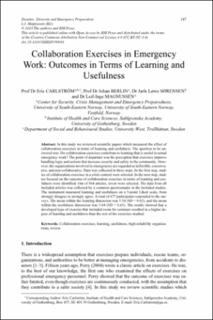Collaboraton Exercises in Emergency Work: Outcomes in Terms of Learning and Usefulness
Chapter
Published version
Permanent lenke
https://hdl.handle.net/11250/2646525Utgivelsesdato
2019Metadata
Vis full innførselSamlinger
Sammendrag
n this study we reviewed scientific papers which measured the effect of collaboration exercises in terms of learning and usefulness. The question to be answered was: Do collaboration exercises contribute to learning that is useful in actual emergency work? The point of departure was the perception that exercises improve handling logic and actions that increase security and safety in the community. However, the organizations involved in emergencies are regarded as inflexible, conservative, and non-collaborative. Data was collected in three steps. In the first step, studies of collaboration exercises in a crisis context were selected. In the next step, studies focused on the outcome of collaboration exercises in terms of learning and usefulness were identified. Out of 564 articles, seven were selected. The data from all included articles was collected by a common questionnaire in the included studies. The instrument measured learning and usefulness on a 5-point Likert scale, from strongly disagree to strongly agree. A total of 477 participants responded to the surveys. The mean within the learning dimension was 3.54 (SD = 0.62), and the mean within the usefulness dimension was 3.64 (SD = 0.65). The results showed that a developed type of exercise that included room for seminars resulted in a higher degree of learning and usefulness than the rest of the exercises studied.
Beskrivelse
This article is published online with Open Access by IOS Press and distributed under the terms of the Creative Commons Attribution Non-Commercial License 4.0 (CC BY-NC 4.0).

